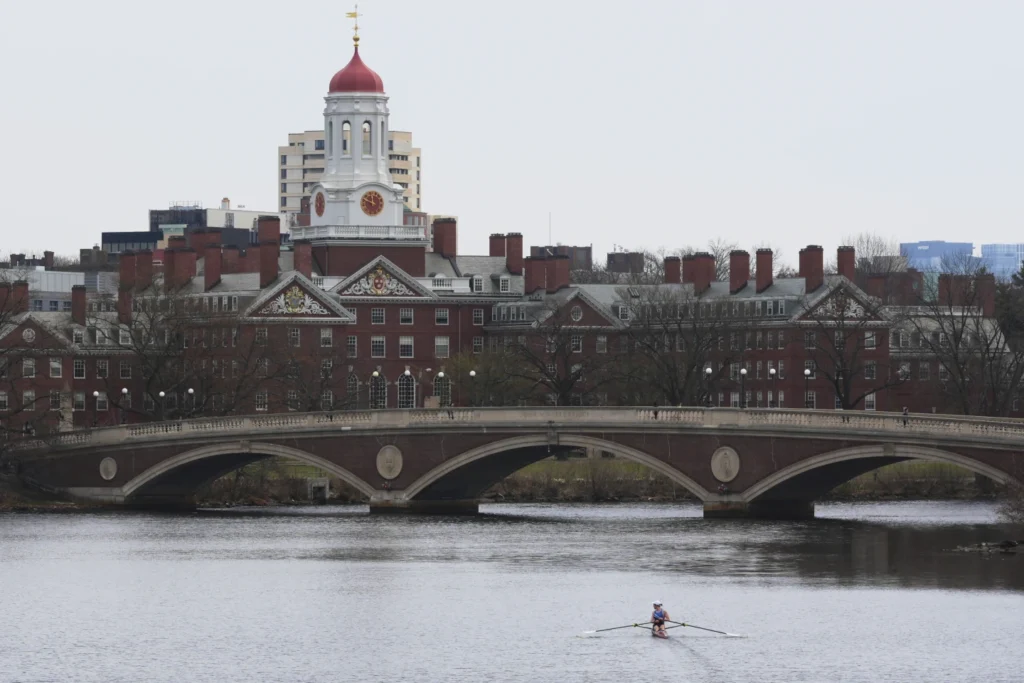BOSTON — A federal judge on Friday blocked the Trump administration from stripping Harvard University of its ability to enroll foreign students, halting what the school described as unconstitutional political retaliation tied to its defiance of White House demands.

U.S. District Judge Allison Burroughs issued a temporary restraining order just hours after Harvard filed suit in Boston federal court, warning the administration’s move would have an “immediate and devastating effect” on the university and more than 7,000 international visa holders.
“With the stroke of a pen, the government has sought to erase a quarter of Harvard’s student body—international students who contribute significantly to the University and its mission,” the lawsuit stated. “Without its international students, Harvard is not Harvard.”
The Department of Homeland Security announced the revocation of Harvard’s certification to host international students on Thursday, accusing the university of fostering an unsafe campus by allegedly enabling “anti-American, pro-terrorist agitators” to intimidate Jewish students. The department also cited unproven claims of collaboration with the Chinese Communist Party, asserting Harvard hosted and trained members of a Chinese paramilitary group as recently as 2024.
Harvard President Alan Garber responded by defending the university’s core principles, saying the school has strengthened governance and launched new efforts to combat antisemitism. Still, Garber maintained Harvard would not compromise its “legally-protected principles” in the face of government pressure.
Friday’s ruling temporarily restores Harvard’s ability to enroll foreign students, including those who were planning to attend summer and fall classes. The administration’s order had sparked chaos just days ahead of graduation, forcing international students—many of whom run labs, teach courses, or coach sports—to consider whether they needed to transfer or risk losing legal immigration status.
The impact was particularly severe at Harvard’s graduate schools. The Kennedy School, where nearly half the student body is international, and Harvard Business School, with about one-third of students from abroad, were among the most affected.
Harvard argued that if the federal order were allowed to stand, the university would be barred from enrolling new international students for at least the next two academic years. Under current regulations, schools stripped of their Student and Exchange Visitor Program (SEVP) certification cannot reapply for one year. Harvard said it would be placed at a global disadvantage, adding that future international applicants may now hesitate to apply, fearing further political reprisals.
The legal battle centers on an April 16 demand from Homeland Security Secretary Kristi Noem, who requested that Harvard submit data on foreign students potentially involved in campus violence or protests. Harvard said it provided “thousands of data points” in good faith, but the department responded Thursday, saying the school had failed to meet its demands. The administration offered no further clarification and instead revoked Harvard’s SEVP certification.
The university’s lawsuit alleges that the action violates not only the First Amendment but also the government’s own rules governing SEVP participation. Typically, schools lose certification for administrative failures—such as losing accreditation, lacking adequate facilities, or not employing qualified staff—not for vague allegations tied to student activism.
Noem’s Thursday letter escalated the dispute by demanding that Harvard turn over all records—including audio and video—of any foreign students participating in protests or deemed involved in “dangerous activity” within 72 hours to avoid permanent disqualification.
Harvard’s legal action is separate from a prior suit it filed against the Republican-led administration over $2 billion in federal funding cuts. But both cases point to an intensifying political clash between the Ivy League institution and Washington.
The administration’s actions have sparked sharp criticism from academic institutions and civil liberties advocates, who view the move as a dangerous precedent in using immigration enforcement as a political weapon against universities.



